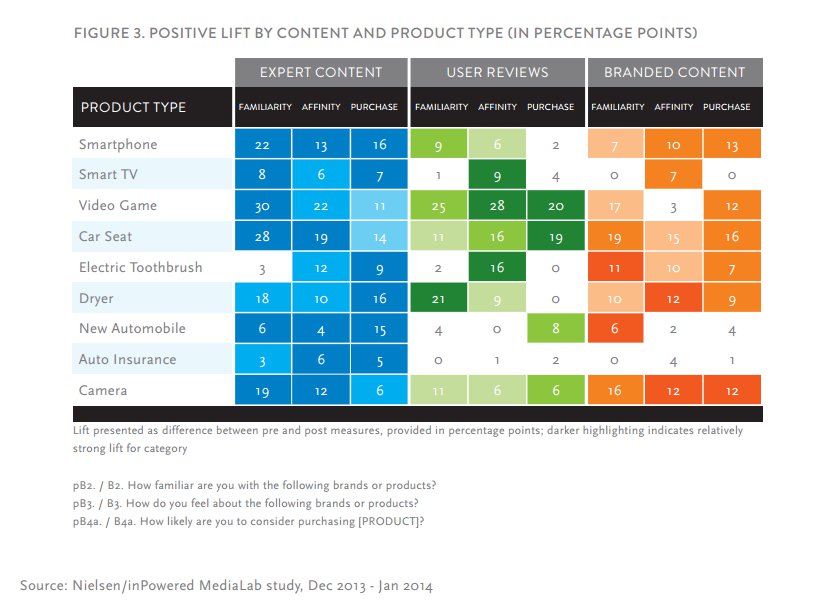Content Marketing – It’s All the Rage But How Well Does It Work?
Content is quite the thing in marketing at the moment. If you’re reading this, you’ve probably already invested in it or are thinking about investing in it.
If you don’t know the theory behind it, it’s all based on Cialdini’s first law of persuasion – the law of reciprocation (or the law of ‘if you scratch my back, I’ll probably be prepared to scratch yours’). If you help someone with useful content, they’ll feel the need to do you a favour back, and that favour will hopefully be some business in the future.
So that’s the theory but does it actually work in practice? Yes, according to a new study produced by inPowered in association with Neilsen.
They took a sample of 900 Americans, recruited off the casino floors of Las Vegas (which seems like an odd recruitment method until your realise that it’s a great way to source respondents originating from all corners of the US) and gave them online questionnaires to complete both before and after being exposed to content related to different product categories. The content the respondents were exposed to was of 3 different types – 3rd party expert, user reviews and branded. The online surveys measured changes in attitudes in 3 different segments of the purchase journey – awareness, affinity and purchase intent.
Here are the results:
To save you examining the chart in detail, here are the main findings:
- Expert content was influential at all stages of the purchase journey for all product categories. It was believed to be more credible than branded content (no surprises there) and more informative then user reviews (well, they are experts after all). Thinking of it from a travel perspective, a write up in a national press travel section is going to carry more weight than copy on a product’s website (be it an hotel, airline etc) or a user review – no surprised there.
- Where product specification was important (in the study, for things like car seats, smartphones or digital cameras), branded content become more influential.
- Where users were deemed to be ‘experts’ then user reviews came into their own. In this study, the prime examples were video games (where gamers trusted other gamers) and car seats (where parents trusted other parents).
- Expert reviews become more influential the more expensive the purchase. User reviews become more influential the lower value the purchase.
- In general, although expert content was the most influential, for most products at most stages of the journey, all 3 types of content had some influence.
Thinking about this study with regard to travel and tourism marketing, the following thoughts occurred to me:
- We all know the value of 3rd party endorsements of our products from the likes of newspapers, magazines, guidebooks, bloggers etc but if we’re not product owners, but rather product recommenders (tour operators, conference & events companies, affiliate sites etc) is our content ‘branded’ or ‘expert’? I’d argue that it’s the latter, so not only can it be highly influential in the purchase journey, we should write that content as if we’re expert reviewers i.e. on the consumers’ side, not on the suppliers side. How often do companies fall into the trap of writing content to appease their suppliers rather than their customers?
- How influential are user reviews? Clearly, the more ‘expert’ those reviewers are, the more influential they are. A Conference or Event Manager would trust the reviews of another Conference or Event Manager. But how influential will someone who’s written a user review on TripAdvisor be? Perhaps the more detailed the review (taking them into the realm of an informative ‘expert’), the more influential it is? Or perhaps it’s the wisdom of the crowd – people look at the aggregate of the feedback and that elevates user reviews on the likes of TripAdvisor onto an ‘expert’ level?
- Product specifications, an area where branded content was seen to be influential, are very important in travel purchase decisions – selecting the best conference room, selecting which airline is best for you, selecting which hotel is best for you, even selecting which destination is best for you relies alot on the ticking of certain boxes.
In general, my impression from this study (other than it’s a pain they didn’t include a travel-related product) is that content is influential, branded content is more influential than perhaps some would expect (50% of the survey didn’t trust branded content to be impartial, but that means 50% did) and the more ‘expert’ (impartial and informative) that branded content can appear, the better.
So if you’ve invested in content, you can breathe a sigh or relief and if you haven’t, what’s stopping you?

